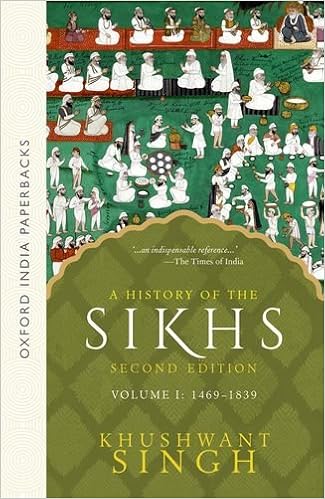 Being a Punjabi I have always been curious about the history of the Punjab. The political history of Punjab is intermingled with the history of the dominant religion in those parts, Sikhism. Also, one often hears phrases like Sikhs made many sacrifices for us, the Sikh Gurus gave their lives for us etc. So, I was naturally curious about their History; I got myself this book written by Mr. Khushwant Singh.
Being a Punjabi I have always been curious about the history of the Punjab. The political history of Punjab is intermingled with the history of the dominant religion in those parts, Sikhism. Also, one often hears phrases like Sikhs made many sacrifices for us, the Sikh Gurus gave their lives for us etc. So, I was naturally curious about their History; I got myself this book written by Mr. Khushwant Singh.In the beginning the author familiarizes us with the topography and climate of the Punjab. Then, Mr Singh, himself a Sikh, dwells into ancient history about the Mohenjo Daro, Indus valley civilizations, whose cradle was the Punjab. Singh, claims that this ancient civilization was later wiped out by the Aryans invaders. The Aryans, bought the Vedic religion to the fore in India and till date are the dominant force in India. The aboriginals were marginalized and the tribals in India today are decedents of the aboriginals. Although after almost 2600 years, anyone claiming that Aryans are still outsiders, and trying to drive political mileage out of it is are just being plain silly. Hinduism, while a great religion has had too many problems, the major one being the caste system, the social hierarchy in which the Brahmins take the top spot(incidentally the same people who came up with the caste system) and Shudhras at the bottom, who were not only given menial jobs but were discriminated and persecuted for centuries. Even in modern day India, this rigid and evil structure persists which the upper casts still exploit.
15th April 1469, Guru Nanak, born into a middle class, hindu, Bedi family was spiritually inclined from an early age. The young Guru could hold his own against erudite theologians. He was married at an early age, 12, child marriage was common in those days. Nanak even had two sons and was later convinced by his sister to find regular employment. Soon, He had his epiphany, and announced to the world his encompassing philosophy where he repeated several times he was "neither a Hindu nor a Muslim". Thus, a new monotheist religion was born. Inspired from the Sufi and Bhakti movements. Nanak used the local language, Punjabi, to spread his word. Guru Nanak, also traveled the world to spread his religion. An anecdote from one of his travels goes something like this: Nanak was travelling in the middle east and was somewhere near mecca, when he got tired and fell asleep. A zealous Muslim started shouting at him; pointing out that his feet were pointing towards Mecca, on hearing this Nanak went back to sleep, the Muslim enraged moved Guru Nanak's feet to a different direction, to his astonishment Mecca moved to where the Guru's feet were, wherever the zealot tried to move the Guru's feet mecca also moved. The Guru pointed out that God was everywhere.